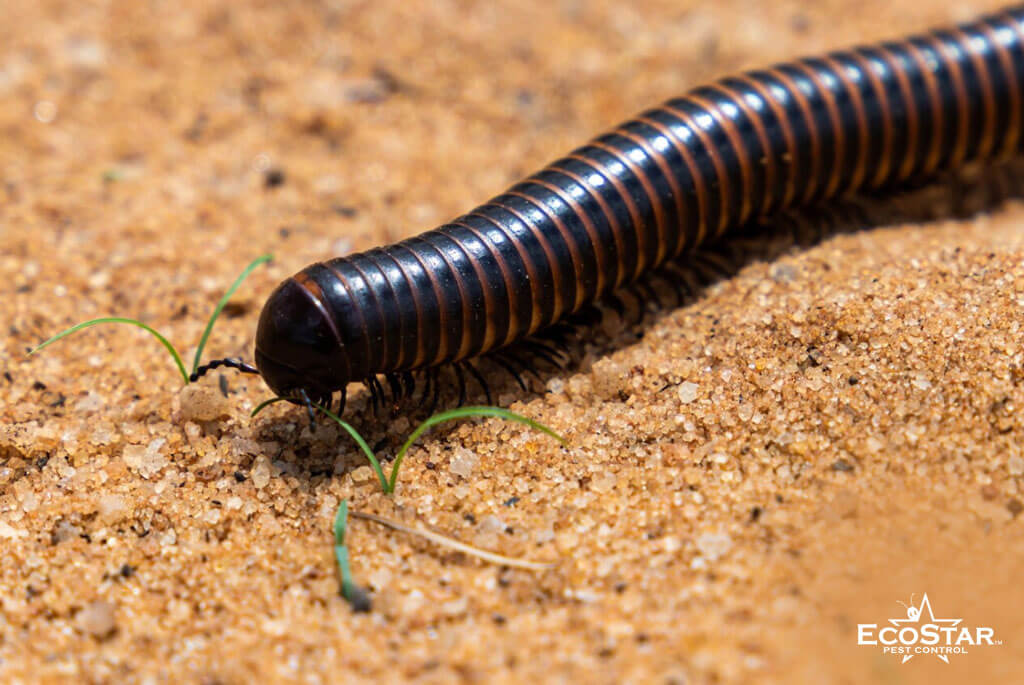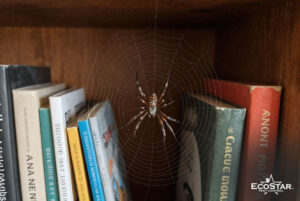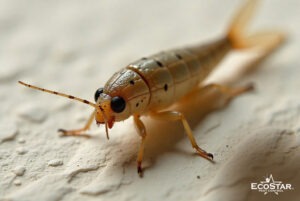Table of Contents
Millipedes might not bite or spread germs, but when they start crawling in your garage floor or the house, they become a real headache. You’ll often see several millipedes after heavy rains or fall seasons in Texas.
These pests love moisture, and once they find it around your home or garage, they’ll start to move in until you fix the issue that attracts them.
Here are seven proven ways to stop millipedes moving in your home and garage.
1. Eliminate Excess Moisture
Millipedes love humid places. If your home has moisture, you’re practically inviting them in your home. We have provided a few common water issues below that you should fix.
- Repair leaky pipes, outdoor spigots, or AC drain lines.
- Keep your gutters clean so rainwater drains away from your home’s foundation instead of collecting near it.
- Use a dehumidifier in basements, crawl spaces, or garages that stay damp to keep the air dry.
When you reduce moisture, millipedes and other pests are less likely to move into your home.
2. Seal Entry Points Around the Home
Millipedes can get inside through small cracks and gaps. We’ve listed a few easy ways below to seal them out.
- Seal gaps around doors, windows, and the garage with weather-stripping or door sweeps.
- Fill foundation cracks with caulk or sealant.
- Check where utility lines enter the home and close up any openings.
Sealing cracks doesn’t just block millipedes. It also helps keep out ants, roaches, and spiders.
Useful Resource:Why Rodents Love Texas Garages and Basements and How to Stop Them
3. Keep Your Yard Dry
Millipedes often come from the yard before sneaking inside. Keeping your yard in good shape can help stop them:
- Don’t over-water the lawn, stick to early morning irrigation.
- Rake up leaf litter, mulch piles, and grass clippings.
- Store firewood off the ground and away from the house.
- Trim back dense vegetation where moisture lingers.
A drier, cleaner yard means fewer hiding spots for millipedes.
4. Reduce Clutter in the Garage and Basement
It doesn’t take long for garages and basements to get cluttered. We’ve all seen how it piles up over time, and that mess traps damp air, exactly what millipedes like.
That makes them a perfect spot for millipedes. Here are a few easy tips to cut down clutter and keep your garage and basement clean.
- Store boxes on shelves instead of directly on the floor.
- Sweep and vacuum regularly.
- Avoid stacking newspapers, cardboard, or damp rags.
With less clutter, you can spot problems sooner. It also keeps millipedes from finding places to hide.
5. Improve Ventilation and Airflow
Moisture is a big reason millipedes move into your home. Poor airflow makes damp spots worse, especially in basements. That situation is what they love. Better ventilation helps keep things dry and less inviting.
- Installing exhaust fans in bathrooms, kitchens, or garages.
- Opening windows or using vents when weather allows.
- Making sure crawl spaces are properly vented.
Moving air helps keep places dry. Less moisture means fewer millipedes.
Useful Resource:How to Eliminate Mosquito Breeding Spots Around Your Home
6. Protect Your Home with Outdoor Barriers
If you see millipedes around your home, need to add an extra layer of protection. Outdoor barriers and treatments can help stop them before they get inside.
- Apply a residual insect barrier spray around the foundation, windows, and doorways.
- Treat mulch beds, patios, and walkways where millipedes gather.
- Focus on shady, damp spots near the house.
A professional Millipedes pest control team can apply safe, long-lasting treatments that create a protective barrier around your home.
7. Call a Local EcoStar Pest Control Expert:
Even with the best DIY efforts, millipedes can still find their way inside, especially during Texas’ rainy seasons. If the problem keeps coming back, it’s time to call EcoStar Pest Control. Our licensed team knows where to look, how to treat the problem safely, and how to keep millipedes (and other pests) from returning.



